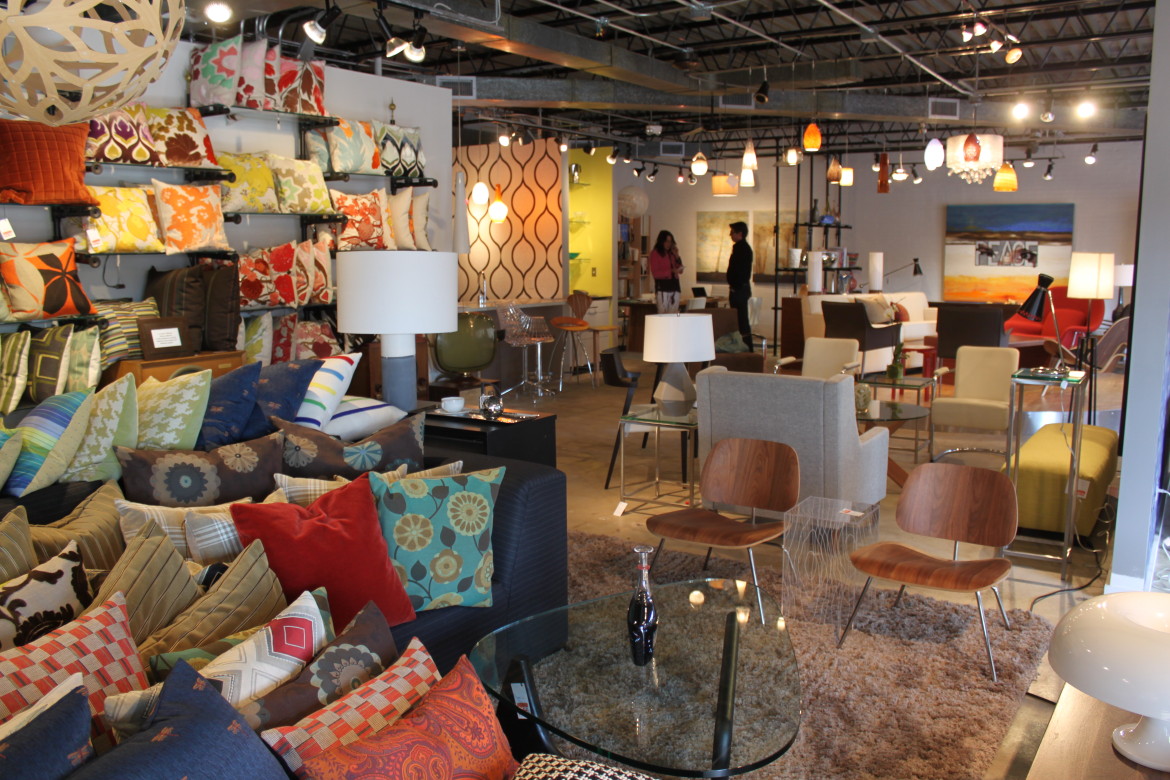A $50,000 loan from the city of Raleigh will soon help the partners of Trig Modern finish renovations to the old downtown office building they opened as a modern furniture showroom last fall.
Lee Tripi, an interior designer, and Bob Drake, a former modern furniture shop owner in Charlotte, used the city’s downtown loan program as a last option after trying to secure funding from private investors and banks for the $200,000 project.
“To date, all other dollars came out of our pockets. Bob sold his house and I had to wait for some inheritance,” Tripi said. “All of our other options had been exhausted.”

Bob Drake, left, and Lee Tripi, right, are using a downtown loan to help their business, Trig Modern.
Trig has been promised the last of six city loans made from a pool of $300,000 aimed to breathe new life into downtown and give chances to urban businesses that might not exist otherwise. Tripi would argue that his business is the type the city wants more of, a unique retail destination that draws visitors from throughout the Triangle to downtown Raleigh.
Nineteen other applicants to the program make similar claims. But they remain in waiting as city officials re-cast a vision for small business lending in Raleigh.
New Loan Program
Tuesday, Raleigh City Councilors voted to fold the outstanding downtown loans (with 5-10 year terms) into a new Revolving Loan Fund to be managed by the Raleigh Area Development Authority and open to small businesses throughout the city.
Combined with $300,000 expected from the sale of four city-owned residences, city officials expect to have a loan pool that can leverage federal, foundation and traditional bank dollars for the first time. They hope to invest more than $5 million in small businesses throughout Raleigh during the next five years.
Downtown restaurants and retail businesses are welcome to apply.
But they’ll be considered alongside small businesses from throughout the city in need of new equipment, office renovation or new office space. In some cases, a loan might be used for working capital. In rare cases a loan will be issued to a startup business.
The fund sets up the city to get its first Community Development Financial Institution, a certification from the U.S. Department of Treasury and important contributor to economic development in any city.
“Now we cast an even broader net, because we have the opportunity, as a CDFI to invest throughout the city in small businesses,” said Wallace Green, director of the Raleigh Area Development Authority.
But seemingly lost in all of those plans has been the downtown loan pool, a program that, after six years, had finally become a viable tool for financing restaurant and retail projects.
The Downtown Raleigh Alliance took over responsibility for promoting the program more than a year ago, after realizing it existed and hadn’t been utilized, said Paul Reimel, the alliance’s economic development manager. The organization championed it for all sorts of potential projects.
Z Pizza used it to add outdoor seating on City Plaza and purchase eco-friendly delivery vehicles. Claremont Real Estate is using a loan to upgrade street-level spaces in a Glenwood Avenue property to lure a retailer or restaurant.
Empire Properties used the program twice, once to expand the small kitchen at the popular Raleigh Times restaurant and also to ready a street-level retail space on East Hargett Street.
“The city loan was a great back-filler,” said Andrew Stewart, president of Empire, which owns 650,000 square feet of space, nearly half of which is downtown. “It allowed us to go in and pull the trigger and make investments in the space.”
Empire has several other outstanding proposals for fund dollars, including a loan to help ready a basement space on Fayetteville Street for a retail tenant.
Reimel hopes to recapitalize the program, aside from the new Revolving Loan Fund, to meet the current and future demand. A proposal making its way through city government seeks another $1 million to grow the program.
City Manager J. Russell Allen said that high a figure would be “very difficult” and “probably unrealistic.”

Trig’s showroom.
He declined to share his own recommendation for the upcoming budget. The future of the program will ultimately be in the hands of the City Council.
In the meantime, the Trig partners will soon begin upgrading the shop’s bathroom, exterior and landscaping. They’ll add another display for kitchen and bath. Tripi hopes the city extends the program so others can take advantage of the resource. He also suggests the fund offer larger loans too.
“It was a small amount, but every little bit helps,” Tripi said. “It probably helps us get to the point where we break even.”
